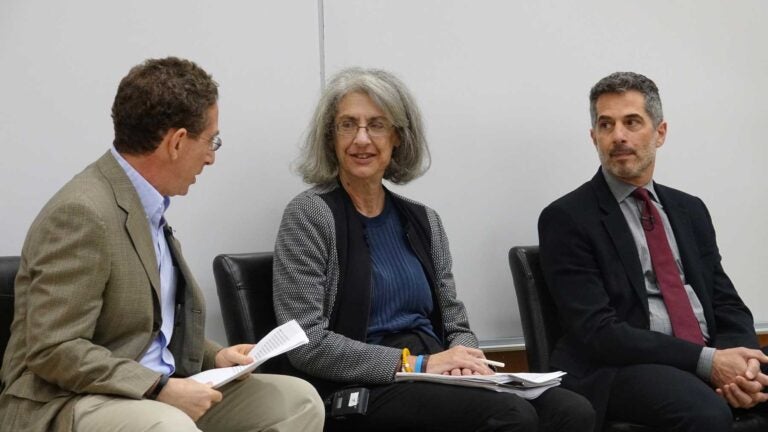
Scott Altman, Elyn Saks and James Bianco atttend the Saks Institute discussion. (Photo/Phil Channing)
When a person is committed against their will: A legal and mental health labyrinth
USC Gould’s Elyn Saks joins with other top legal minds to discuss involuntary commitment to mental hospitals
Elyn Saks understands what it’s like to be committed to a mental hospital against your will.
It happened to her.
More than three decades ago, she was involuntarily placed in a hospital for 15 days after a psychotic breakdown at Yale Law School. The experience still haunts Saks, who was diagnosed with schizophrenia shortly after the episode. Today, she is a professor at the USC Gould School of Law.
The traumatic event propelled a career dedicated to the rights of those with mental health problems and the legal issues surrounding them. It’s an area that has only taken on greater magnitude as society struggles with the weight of increasing numbers of citizens with mental illness who are living on the streets. At the same time, mental health teams are straining to remove those with mental illness from jails and get them the kind of treatment they need — while also protecting the public.
Saks, recipient of a MacArthur Fellowship “genius grant” and founder of USC’s Saks Institute for Mental Health Law, Policy and Ethics, has used her influence and compelling testimony to shine light on the subject in Los Angeles and nationally. In addition to writing a bestselling memoir and giving a widely viewed TED talk, Saks inspired a chamber opera through her life story. Most recently, she raised the profile of the issue of involuntary commitment at a sold-out lecture at USC Gould in October.
Legal minds
Through events such as the lecture, she has brought in legal minds like Los Angeles County Superior Court Judge James Bianco ’87, who rules on cases in Los Angeles’ mental health court. At the “Held Against My Will: Mental Health, Consent and the Law” event, Bianco spoke about issues facing the courts when deciding if an individual with mental illness should be committed.
Bianco says he strives to make decisions fairly based on facts presented in court. “We are fortunate that both sides are represented by attorneys, typically from the Public Defender’s and District Attorney’s offices, who are very experienced and committed to this work,” Bianco said. “They do an excellent job of developing the facts and presenting the issues.”
Putting someone away without their consent is a kind of assault on a person’s integrity and lifestyle.
Elyn Saks
Yet involuntary commitment brings costs in areas Americans hold dear: liberty and dignity. Saks shares her own story about it so that others will understand its profound implications. “Putting someone away without their consent is a kind of assault on a person’s integrity and lifestyle,” Saks said.
Although she is philosophically opposed to most involuntary commitments, Saks understands that circumstances may force judges to intervene. “If someone has a mental illness and is suicidal or a danger to others, there’s no question that intervention is necessary. But there are often times that people are put away simply because they are acting oddly.”
“I believe we should help people seek treatment on their own instead of using force. This is the best for everyone in the long run,” Saks said.
Huge numbers
Experts acknowledge that the sheer number of mental health cases is one of the biggest challenges facing the legal system as it grapples with societal problems. “The volume is huge,” Bianco said. “The cases we hear in court are only a fraction of what’s heard at the hospital level.”
Because people held for 14 days and beyond are entitled to a hearing at a hospital, hearing officers administer as many as 30,000 hospital hearings each year. After 14 days, patients are entitled to another hearing in court. Sometimes patients appeal the administration of medication they don’t want to receive in the hospital — and judges have to determine whether a patient has the capacity to consent to medication.
“Those are obviously very important, sensitive issues,” Bianco said.
Saks personifies how mental illness goes beyond stereotypes. She was valedictorian at Vanderbilt University, a Marshall scholar at Oxford University and an honors student at Yale Law School, and today is a respected legal scholar at USC Gould — yet she continues to endure stigma and challenges.
“That’s why I want to hold these dialogues,” she said. “The more we know about the legal and societal challenges and issues facing people who have mental illness, the less we will be stigmatized.”
See and hear Elyn Saks share her story through this TED talk:
